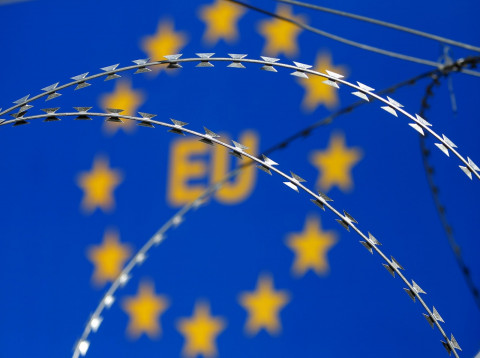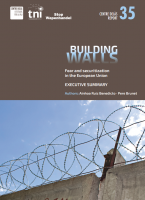Berlin wall´s 30th anniversary: the businesses booming from Europe’s new walls
Temas
Regiones
On the 30th anniversary of the fall of the Berlin wall, a new report reveals the European businesses profiting from the construction of new walls across Europe. It identifies three key players – the arms firms Thales, Airbus and Leonardo – as well as a whole host of construction, shipping, technology and security firms from across Europe winning border militarisation contracts.

(Press release - Amsterdam/Barcelona/Brussels, 5 November)
The report, ‘The Business of Building Walls’, examines the industry involved in building the many different kinds of walls constructed - especially since 2015 - to keep refugees and migrants out of Europe. It looks at those involved in the construction of the walls and fences and the technology that accompanies them, as well as the ‘maritime wall’ built across the Mediterranean and the ‘virtual’ walls of surveillance and biometrics that extend across Europe. It argues that these are all walls as their primary objective is to keep people out, with often deadly consequences.
The report is co-published by the Transnational Institute (TNI), the Dutch campaign against the Arms Trade (Stop Wapenhandel) and Delàs Center. It is a sequel to ‘Building Walls’ published in 2018 that measured and detailed the various walls within Europe.
In 2019, the walls continue to grow. Slovenia extended its wall with Croatia by 40 kilometres in 2019 and Latvia announced plans for a new fence on the border with Belarus. Since 1990, the EU and Schengen Area states have built around 1000 kilometres of land walls, the equivalent of six Berlin Walls in order to stop the arrival of forcibly displaced people into Europe. If you include the maritime operations that prevent migration, then the walls extend a further 4750 kilometres.
These walls have resulted from a surge in public spending by the EU and its member states on border security. Mark Akkerman, author and researcher of the report argues: “The European military and security industry through their successful lobbying has succeeded in framing migration as a security threat rather than a humanitarian challenge. This has turned on a seemingly limitless tap of public funding for militarising our borders yet prevented the policies and investments we need to respond humanely to refugees and to tackle the root causes of forced migration.”
Available data shows at least €900 million has been spent on land walls and fences, €676.4 million on maritime operations (2006 to 2017) and €999.4m on its virtual walls (2000-2019). In addition, companies have benefited from the €1.7 billion budget of the European Commission’s External Borders Fund (2007-2013) and the €2.76 billion Internal Security Fund – Borders ( 2014-2020). In the next EU budget cycle (2021–2027), the European Commission has earmarked €8.02 billion to its Integrated Border Management Fund (2021-2027) and €11.27 billion to its coastguard agency Frontex.
In addition to the three giant European military firms Thales, Leonardo and Airbus that have played a critical role in Europe’s many walls, many other companies in the construction, shipping and technology sectors have also cashed in.
Prominent corporate beneficiaries in terms of Europe’s walls include European Security Fencing, a Spanish producer of razor wire, used in fences bordering Spain/Morrocco, Hungary/Serbia, Bulgaria/Turkey, Austria/Slovenia, UK/France; Slovenian company DAT-CON involved in constructing walls in Croatia, Cyprus, Macedonia, Moldova, Slovenia and Ukraine; Dutch shipbuilder Damen whose vessels have been used in border operations by Albania, Belgium, Bulgaria, Portugal, the Netherlands, Romania, Sweden and the UK, in key Frontex operations as well as by Libya, Morocco, Tunisia and Turkey; French technology company Sopra Steria, the main contractor for the development and maintenance of the Visa Information System (VIS), Schengen Information System (SIS II) and European Dactyloscopy (Eurodac) and Spanish firm GMV for its work for Eurosur, the European Border surveillance system – all key pillars of EU’s virtual walls.
Niamh Ni Bhriain of Transnational Institute says, “As we celebrate the fall of the Berlin Wall, it is tragic that so many new walls have been built across Europe to keep out the most vulnerable people on our planet. This report shows that the new era of building walls is driven by a powerful military and security industry that have shaped EU border policies and reaped the financial rewards.”
Ainhoa Ruiz Benedicto, researcher for the first Building Walls report concludes, “These corporations’ domination of border policies and budgets has played a critical role in eroding the human rights of people who migrate and seek asylum. It has also proved deadly: at least 15,000 people alone have died in the Mediterranean alone since as they are forced to take ever more dangerous and deadly routes to escape war, repression or poverty.”

